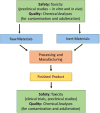Naturally complex: Perspectives and challenges associated with Botanical Dietary Supplement Safety assessment
- PMID: 29626579
- PMCID: PMC6087675
- DOI: 10.1016/j.fct.2018.04.007
Naturally complex: Perspectives and challenges associated with Botanical Dietary Supplement Safety assessment
Abstract
Due to the extensive use of botanical dietary supplements by consumers in the United States, there is a need for appropriate research and data to support safety assessments. Complexity and variability, both natural and introduced, of botanical dietary supplements make research on these products difficult. Botanical dietary supplements are regulated by the Food and Drug Administration (FDA) under the Federal Food, Drug, and Cosmetic Act (FD&C Act), as amended by the 1994 Dietary Supplement Health and Education Act (DSHEA). They are regulated as a category of food, which differs from the regulation of pharmaceutical products. Both manufacturers and the FDA are faced with the challenge of determining the best approaches for evaluating and monitoring the safety of botanical products. High quality botanicals research requires accurate identification and characterization of the material being studied. Inconsistent results in efficacy studies of botanical dietary supplements have led to efforts to improve the rigor and reproducibility of research in the field. Addressing the challenges associated with botanical dietary supplement safety is a global effort requiring coordination between numerous stakeholders, including researchers, suppliers, manufacturers, and regulators, all of whom play a role in ensuring that high quality products are available on the market.
Figures
References
-
- Abdel-Rahman A, Anyangwe N, Carlacci L, Casper S, Danam RP, Enongene E, Erives G, Fabricant D, Gudi R, Hilmas CJ, Hines F, Howard P, Levy D, Lin Y, Moore RJ, Pfeiler E, Thurmond TS, Turujman S, Walker NJ. The Safety and Regulation of Natural Products Used as Foods and Food Ingredients. Toxicol Sci. 2011;123:333–348. - PubMed
-
- Al-Amier H, Nasr KA, Lueck L, Gardner ZE, Craker LE. Phytochemical Variation in Black Cohosh Populations. In: Khan IA, editor. Proceedings of the IVth International Conference on Quality and Safety Issues Related to Botanicals: University, MS, USA, August 15 - 18, 2005. ISHS; Leuvin, Belgium: 2006. pp. 95–100.
-
- Azwanida NN. A Review on the Extraction Methods Use in Medicinal Plants, Principle, Strength and Limitation. Medicinal & Aromatic Plants. 2015;4:196–202.
-
- Barnes PM, Bloom B, Nahin RL. National Health Statistics Report. 12. National Center for Health Statistics; Hyattsville, MD: 2008. Complementary and alternative medicine use among adults and children: United States, 2007. - PubMed
Publication types
MeSH terms
Substances
Grants and funding
LinkOut - more resources
Full Text Sources
Other Literature Sources
Medical


